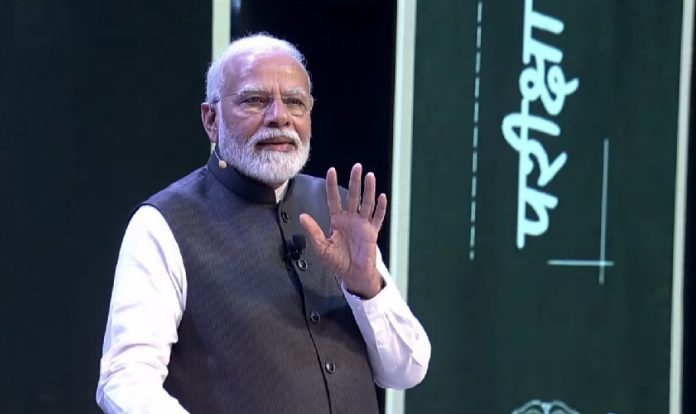Himanta Biswa Sarma Mocks Opposition as ‘Bouncers’ Amid Controversy Surrounding New Parliament Launch Assam Chief Minister, Himanta Biswa Sarma, took a swipe at the opposition parties on Wednesday, accusing them of engaging in a theatrical boycott to save face amidst the controversy surrounding the inauguration ceremony of the new Parliament building. Sarma suggested that the opposition parties were caught off guard by the swift completion of the construction, stating, “They never thought that the construction would be completed so soon.”
He further alleged that the opposition’s boycott was merely a dramatic act to protect their image, stating, “So, everything has happened like a bouncer for the Opposition. Just to save their face, they are enacting the drama of boycott… Parliament House will open on the day associated with Veer Savarkar. That might be another reason for them to oppose or boycott the function.”
Political Rivalry and Symbolic Struggles: The Controversy Surrounding India’s New Parliament Building Inauguration
Nineteen political parties jointly issued a statement announcing their decision to boycott the inauguration ceremony on May 28, which would be attended by Prime Minister Narendra Modi. The statement expressed the view that with democracy being undermined within the Parliament, the new building held no significance. They declared their collective resolve to continue their fight against the authoritarian Prime Minister and his government, and vowed to take their message directly to the people of India.
The statement further criticized the decision to proceed with the inauguration without the President, stating, “Murmu is not only the Head of State but also an integral part of the Parliament… In short, the Parliament cannot function without the president. Yet, the prime minister has decided to inaugurate the new Parliament building without her.”
Nineteen opposition parties, including the Congress, Aam Aadmi Party (AAP), Trinamool Congress (TMC), Communist Party of India (CPI), Communist Party of India (Marxist) (CPIM), Janata Dal-United (JDU), Rashtriya Janata Dal (RJD), Dravida Munnetra Kazhagam (DMK), Nationalist Congress Party (NCP), Shiv Sena (UBT), Viduthalai Chiruthaigal Katchi (VCK), Samajwadi Party (SP), Jharkhand Mukti Morcha, and Kerala Congress (Mani), have all decided to boycott the event.
In summary, Himanta Biswa Sarma’s remarks targeted the opposition parties, referring to their boycott as a theatrical move to protect their reputation. The controversy surrounding the new Parliament building’s inauguration has fueled tensions between the ruling party and the opposition, highlighting the ongoing political divide in the country.
Himanta Biswa Sarma’s comments likening the opposition’s actions to a “bouncer” serve to further intensify the verbal sparring between the two sides. By suggesting that the opposition was caught off guard by the swift completion of the construction, Sarma aimed to undermine their credibility and portray them as reactive rather than proactive.
However, the opposition parties have stood firm in their decision to boycott the inauguration, emphasizing their commitment to fighting against what they perceive as authoritarian tendencies within the current government. They argue that the symbolism of the new Parliament building holds little value when democratic principles are being undermined within the controversy of legislative body itself.
The absence of the President at the event has also raised concerns among the opposition. As the Head of State and an integral part of the Parliament, they argue that the inauguration should not proceed without her presence. They question the Prime Minister’s decision to proceed with the ceremony despite the President’s absence, emphasizing the significance of her role in the functioning of the Parliament.
On the other hand, the ruling party has defended the decision to move forward with the inauguration, asserting that the construction of the new Parliament building has been completed within the scheduled timeframe. They maintain that the opposition’s boycott is an attempt to salvage their own image rather than a principled stand against the government.
The controversy surrounding the new Parliament building inauguration reflects the broader political landscape in the country, characterized by a polarized and confrontational relationship between the ruling party and the opposition. Both sides are utilizing various tactics to gain political advantage and shape public opinion.
Controversy and Confrontation: The New Parliament Building Inauguration Unveils Political Rifts
As the date of the inauguration approaches, it remains to be seen how the events will unfold. The opposition’s decision to boycott the ceremony sends a strong message of dissent, while the ruling party is determined to proceed as planned. The controversy surrounding the event highlights the deep-seated ideological differences and power dynamics that continue to shape Indian politics.
The opposition’s joint statement, signed by 19 parties, expresses their concerns about the erosion of democratic values and the perceived disregard for the role of the President in the functioning of the Parliament. They argue that inaugurating the new building without the President sends a symbolic message of sidelining democratic principles. The opposition is resolute in their decision to boycott the event, stating that they will continue to fight against the current government and convey their message directly to the people.
On the other hand, the ruling party dismisses the opposition’s concerns as mere theatrics and attempts to discredit the government. Himanta Biswa Sarma’s remark likening the opposition’s actions to a “bouncer” reflects the ruling party’s strategy of portraying the opposition as reactive and lacking foresight. The ruling party maintains that the completion of the construction within the scheduled timeframe is a testament to their efficiency and commitment to infrastructure development.
The controversy surrounding the inauguration of the new Parliament building is not limited to the immediate event itself. It is symptomatic of the larger political climate in the country, characterized by heightened polarization and a deepening divide between the ruling party and the opposition. Both sides are engaged in a battle for public perception and political advantage, employing rhetoric and strategic maneuvers to bolster their controversy positions.
As the date of the inauguration draws near, the spotlight will remain on the unfolding events and the reactions from both the ruling party and the opposition. The controversy underscores the challenges of democratic governance and the constant struggle between competing ideologies and visions for the future of the country.
In the midst of these political tensions, it is crucial for all stakeholders to remember the core values of democracy, including respect for differing viewpoints, open dialogue, and the pursuit of common goals. The fate of the new Parliament building and its symbolism as a democratic institution will depend not only on its physical structure but also on the collective efforts of political leaders to bridge divides, promote inclusivity, and uphold the principles of democratic governance.
Ultimately, the controversy surrounding the inauguration serves as a reminder of the complexities and intricacies of Indian politics, where power struggles, ideological clashes, and competing visions of governance constantly shape the trajectory of the nation.

